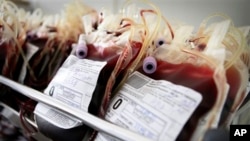Faced with worsening economic challenges and growing unemployment, Zimbabwe could be losing lives unnecessarily daily due to the high cost health care, including the steep cost of blood, which remains beyond the reach of many people.
With a unit of blood, which is 250 milliliters, priced at $135 at public hospitals, many Zimbabweans are complaining that the cost of blood is far beyond their reach.
Harare residents, who spoke with Studio 7, said blood is not a luxury and as a result, the government should subsidize the precious liquid to save lives, especially as people donate the blood for free.
The cost of blood is even higher at private hospitals and clinics. Studio 7 visited a number of hospitals in the capital and found many patients and their families saying they are having to sell their priced possessions on the cheap to the save lives of loved ones. But others are stranded, they just have nothing.
Tabeth Mhungu, who bled severely after giving birth recently, said her life is in danger as she is stranded at hospital after failing to purchase blood, putting also the life of her first born child at risk.
“It was actually shocking to me to discover that two pints of blood cost more than $200 and to someone like me who doesn't have a stable job its very expensive and I can't afford it. I therefore recommend that government should subsidize the cost of blood and save lives,” said Mhungu.
Victor Mukonoweshuro's relative was involved in an accident recently and lost a lot of blood but he was unable to purchase the three units needed for infusion. Mukonoweshuro said the price being charged for the blood that is donated freely is exorbitant.
“We are surprised that blood can cost $135 which is way off considering that blood is donated for free. At the moment I have a relative who is admitted at Parirenyatwa Hospital due to a car accident. She needs additional blood but we cannot afford to buy the required blood because the price is very high. You can imagine buying blood for $135 per pint. We failed to buy the three pints needed and she is suffering in hospital,” said Mukonoweshuro.
Beauty Kanoto's husband needs blood before a mandatory operation to save his life. But she cannot afford to buy the blood for him.
“Blood is very expensive and we can’t afford to buy it. I have a patient who needs to go to the theatre and they want blood. I can't afford to get it. I am confused and don't know what to do since the patient is very ill.”
National Blood Service Zimbabwe’s public affairs manager, Esther Masunda, defended the high cost of blood in Zimbabwe.
Masunda said, “When you are looking at the cost of blood, we have overheads that we incur as a service. We are looking at the recruitment side when our teams go out to get and collect the blood and mobilize the donors. We are also looking at the pack itself where the blood is put when the donor is being bled.
“It is also a cost as the blood bags aren't manufactured in Zimbabwe or Africa but are supplied from Europe. When the blood is collected and is being processed it needs to be tested and goes through a number of tests and the test kits are also expensive.”
Masundah told Studio 7 that due to the prevailing economic conditions, the government has stopped subsidies to the national blood service, adding this has contributed to the high cost of blood.
According to the NBSZ, adults who use 80 percent of the blood from the blood bank are the least in terms of donating blood at 20 percent while school pupils who donate 80 percent of the blood collected in Zimbabwe are the least users at 20%.





